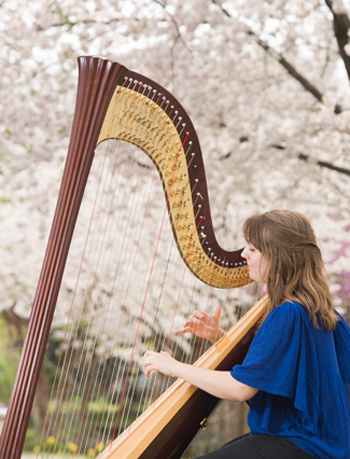MyVU has profiled a dozen members of the Class of 2016 who embody Vanderbilt’s missions of inclusion and community. Representing a diversity of backgrounds and experiences, they’ve pursued diverse interests at the university. We’re featuring their stories in the lead up to Commencement on May 13.

Michaela Novakovic’s majors take her from the grand to the microscopic on a daily basis. The Sorrento, Florida, native and Blair School of Music senior is a double major in harp and molecular and cellular biology.
Her constant companions run the gamut in size. There’s her concert grand harp named “Maria,” which is more than 6 feet tall, weighs 79 pounds, has seven pedals—one for each note in the scale—and 47 strings. To take it from one place to another, Novakovic has to transport it on a cart.
On the other end of the spectrum is her research subject—the neurobiology of the cell, specifically dendritic development in the neurons of the nonparasitic nematode C. elegans, in Professor David Miller’s worm lab.
The interest in neurobiology came after she arrived at Vanderbilt, but the harp entered her life when she was 9 years old.
“My mom played the piano, and I was fascinated by it. She taught me to play, and I kept up with practice,” Novakovic said. “[rquote]I really wanted to learn a second instrument. My dad heard a harp and decided I would be good at that, and I loved it once I started.”[/rquote]
At Vanderbilt, Novakovic decided to take a chemistry class “for fun.”
“I didn’t realize at the time that it was a ‘weed-out’ course for medical school, but I really enjoyed it,” she said. “So I kept on taking other science classes, particularly biology classes, until I had enough for a major.”
Novakovic spends eight to 10 hours a week in Miller’s worm lab, where as a Summer Research Program Fellow she spent as many as 40-45 hours a week. She practices the harp 20 hours a week, not including time spent in rehearsals for recitals and performances.
She also keeps a busy schedule teaching harp to precollege students at Blair and volunteering at the W.O. Smith Community Music School and with Vanderbilt Student Volunteers for Science. She has served as a teaching assistant for several Blair professors in the musicology and composition departments as well as for introductory biology labs. “I’ve really enjoyed teaching,” Novakovic said. “I love lecturing, leading review sessions, grading, administering tests—every bit of it, really.”
Her interests in music and neurobiology are now coming together in her study of music cognition. She is currently working with Reyna Gordon, research assistant professor of otolaryngology, in the music cognition lab to develop an app for studying the relationships between motor tempo, grammar, rhythm skills and genetics.
Though she may be heading to graduate school in music cognition, Novakovic has no plans to abandon “Maria.”
“My harp has stuck with me through all those awkward high school years, and she’s wonderful. I could never give up the harp,” Novakovic said. “I’m not sure I’ll be able to keep up the same level of performance, but I could never stop playing.”